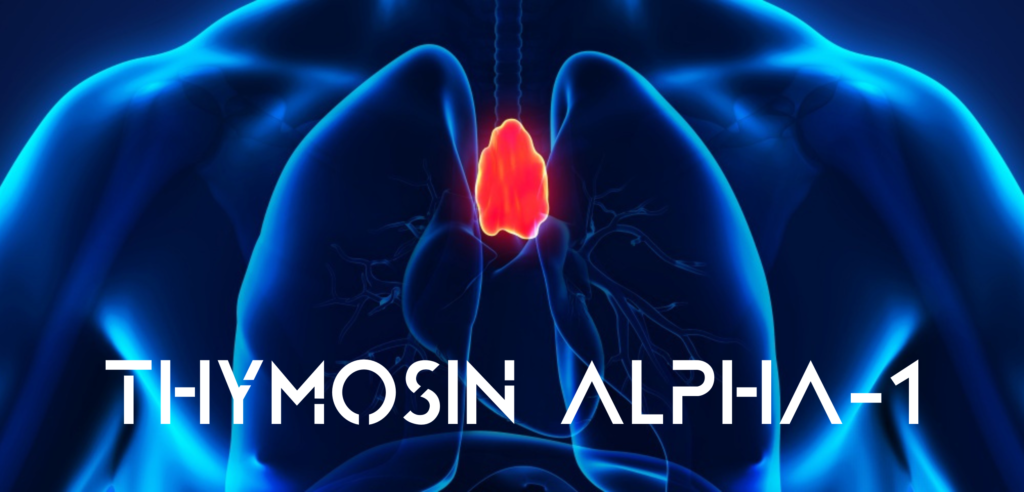Thymosin alpha-1 (Tα1) is an extremely intriguing peptide.
It offers two bold promises: optimized human health and increased longevity for humans.
A true biological treasure trove, it is the focus of research ranging from modulating the immune system to treating chronic diseases and optimizing human performance.
Let’s explore together the history, function, effects, and dosages of biohacker protocols surrounding Thymosin alpha-1.
Origins and Discovery.
The history of Thymosin alpha-1, a small molecule with big implications for human biology and medicine, is as fascinating as its biological function.
Its story begins in the early 1970s, a time of great discovery in the field of immunology.
It was during this period that researchers, exploring the depths of the human immune system, first isolated thymosin alpha-1 from the thymus, a gland located strategically behind the sternum and central to the development of the human body’s immune defenses.
The thymus, long recognized as a vital organ for the maturation of immune cells, especially T lymphocytes, turned out to be the cradle of this powerful molecule.
Thymosin alpha-1, with its 28 amino acid structure, quickly emerged as a key factor not only in the maturation of T lymphocytes but also in the regulation of a wide range of immune responses.
Researchers discovered that its presence or absence could significantly influence the immune system’s ability to fight infection, respond to inflammatory stimuli and even recognize and destroy cancer cells.
The isolation and characterization of thymosin alpha-1 were breakthrough moments that opened new avenues in understanding the complex world of immunology.
This discovery was the result of pioneering work involving advanced techniques in biochemistry and molecular biology, allowing scientists to begin to crack the code of the cellular and molecular interactions that govern the immune system.
The relevance of this peptide went beyond pure scientific curiosity.
Its crucial role in regulating immune responses made it an ideal candidate for targeted therapeutic applications.
As the research expanded, it became clear that Thymosin alpha-1 would have a significant impact not only in treating viral diseases and fighting cancer but also as a potential therapeutic agent in a range of autoimmune disorders and immunodeficiency conditions.
Thymosin alpha-1 has become a symbol of the limitless possibilities emerging from the convergence of basic research and clinical applications, promising new horizons in the prevention, diagnosis, and treatment of complex diseases.
Function and Mechanism of Action.
Thymosin alpha-1 (Tα1) operates at the heart of the immune system with precision and complexity.
To better understand its role, let us explore in detail how this molecule affects immune function.
Tα1 acts as a “conductor” in the immune system, promoting the activation and maturation of T lymphocytes, specialized cells that are crucial in the body’s defense against pathogens and diseased cells.
This process is critical not only for a prompt response to infection but also for maintaining continuous surveillance toward cells that might turn cancerous.
One of the most remarkable aspects of Tα1’s action is its ability to influence the differentiation of T lymphocytes into different subpopulations, each with specific functions:
- T helper 1 (Th1) cells:
They are essential in fighting intracellular infections, such as viruses and some bacteria, by stimulating cell-mediated immunity.
Tα1 promotes the activity of these cells, enhancing the body’s ability to destroy pathogens hiding within host cells. - T helper 2 (Th2) cells:
These cells are involved in defense against extracellular pathogens, such as most bacteria and parasites, by promoting antibody production.
Tα1 also modulates this response, ensuring that the immune system can respond effectively to a broad spectrum of threats.
Through regulating the balance between Th1 and Th2 cells, Tα1 optimizes the body’s immune response.
The immune system uses T helper cells to defend itself against invaders.
There are two main types: Th1 and Th2.
Th1s fight pathogens that enter our cells, such as viruses and some bacteria, but if activated too much they can cause autoimmune diseases, where the body attacks itself.
Th2s help against pathogens outside the cells, such as parasites, and stimulate antibody production, but an overreaction of Th2s can lead to allergies and a less effective defense against intracellular infections.
It is critical to maintain a balance between Th1 and Th2 for an effective immune response without adverse side effects.
Tα1 helps maintain this delicate balance, ensuring an effective and balanced immune response.
In addition, Tα1 plays a significant role in the antitumor response.
By stimulating the activity of immune cells, including natural killer (NK) cells and cytotoxic T lymphocytes, it helps to recognize and destroy tumor cells.
Its action in promoting an appropriate immune response makes Tα1 a valuable ally in the fight against cancer by enhancing the immune system’s ability to identify and attack malignant cells.
In summary, Thymosin alpha-1 is a powerful molecule that exerts a profound influence on the immune system.
Through a series of sophisticated mechanisms, Tα1 not only enhances the immune response against infection and cancer but also helps maintain the balance needed to prevent excessive or inappropriate immune reactions, underscoring its crucial role in health and disease.

Effects and Benefits.
Thymosin alpha-1 (Tα1) has emerged as an important ally in the fight against a variety of medical conditions due to its ability to modulate and boost the immune system.
Research on this molecule has revealed promising effects in several areas, offering new hope and therapeutic strategies.
Viral Diseases.
In the context of viral diseases, such as chronic hepatitis B and C infections, Tα1 has shown remarkable potential in improving the efficacy of standard treatments.
These infections represent a significant, as they can evolve into more serious diseases, such as cirrhosis hepatocellular carcinoma.
The ability of Tα1 to stimulate the immune system allows for better virus-fighting, enhancing the host immune response and facilitating virus elimination.
In particular, Tα1 can increase the activity of NK cells and T lymphocytes, which are crucial in destroying virus-infected cells, thereby reducing viral load and promoting resolution of the infection.
Cancer.
In the cancer setting, Tα1 is being investigated as an adjuvant therapy for its role in amplifying the immune response against cancer cells.
Its immunomodulatory action may theoretically make the immune system more effective in identifying and destroying cancer cells, a promising approach given the ability of some tumors to “hide” from the immune system.
Tα1, by stimulating a more vigorous immune response, can potentially counteract this evasion mechanism, offering a therapeutic advantage in cancer treatment, either as monotherapy or in combination with other therapies, such as chemotherapy or immunotherapy, to improve their efficacy and reduce disease progression.
Thymosin alpha-1 helps strengthen the immune system.
People who have immunodeficiencies, that is, conditions in which the immune system does not function well, may benefit from this peptide.
Immunodeficiency conditions can be congenital, meaning that a person is born with them, or they can be acquired, developing due to disease, infection or the effect of medical treatments such as chemotherapy.
Tα1 works by stimulating the activity of immune cells, helping the body to fight infection and disease.
Intervening with Tα1 can help mitigate this vulnerability by increasing the immune system’s ability to defend itself against pathogens.
This effect is particularly valuable for patients undergoing immunosuppressive treatments, such as those for organ transplants or autoimmune diseases, where the risk of infection is high.
By enhancing immune defenses, Tα1 can provide additional protection against a wide range of bacterial, viral, and fungal infections.
Thymosin alpha-1 (Tα1), with its broad spectrum of immunomodulatory effects, stands as a promising candidate for the treatment and management of a wide variety of pathological conditions, in addition to those already mentioned such as viral diseases, cancer, and immunodeficiencies.
Its ability to boost the immune system by enhancing both innate and adaptive responses opens the door to multiple therapeutic applications.
Let us look at some of them in detail:
Autoimmune Diseases.
Thymosin alpha-1 (Tα1) has attracted considerable interest in the field of medicine because of its ability to modulate the immune system in a precise and controlled manner, a particularly significant potential for the treatment of autoimmune diseases.
These diseases, characterized by an immune response mistakenly directed against healthy tissues in the body, present a considerable therapeutic challenge because of their complex nature and the variety of symptoms they can cause.
In autoimmune diseases such as multiple sclerosis, rheumatoid arthritis, and systemic lupus erythematosus, excessive immune system activity leads to chronic inflammation and tissue damage.
Tα1, by acting on the Th1/Th2 balance, may help reduce this immune overactivity, promoting a more balanced and less autoreactive response.
This peculiarity of Tα1 offers a promising strategy to reduce inflammation and associated symptoms, thereby improving patients’ quality of life.
By integrating Tα1 into existing therapeutic strategies, a reduction in systemic inflammation and disease-specific symptoms can be targeted.
For example, in multiple sclerosis, where inflammation in the central nervous system can lead to progressive neurological damage, modulation of the immune response could help protect nerve fibers and slow disease progression.
Similarly, in rheumatoid arthritis, reducing inflammation in the joints could decrease pain and improve joint function, while in lupus, addressing immune overactivity could prevent damage to vital organs such as the kidneys, heart, and lungs.
Respiratory System Infections.
In the context of acute and chronic respiratory infections, including chronic obstructive pulmonary disease (COPD) and COVID-19, Thymosin alpha-1 may play a crucial role in enhancing the immune response against respiratory pathogens.
Its ability to enhance NK cell activity and modulate T lymphocyte response may help reduce the severity and duration of infections.

Aging and Longevity.
In anti-aging and longevity research, Thymosin alpha-1 (Tα1) represents a promising frontier due to its unique ability to interact with and modulate the immune system, which tends to decline with advancing age.
This decline, known as immunosenescence, contributes significantly to the increased vulnerability to pathogens and the onset of chronic diseases in the elderly.
In this context, Tα1 stands out for its potential to invigorate immune capabilities, serving as a powerful tool to mitigate the effects of aging on the immune system.
Tα1 exerts its beneficial effects through several pathways.
One of the most important is its ability to rebalance immune responses, boosting those that are weakened and modulating those that are overactive.
This means it can help restore a more youthful and dynamic immune function, characterized by an effective response against infection and optimal regulation of inflammatory responses, thereby reducing the risk of developing chronic diseases associated with systemic inflammation.
By increasing the effectiveness of the body’s natural defenses, Tα1 contributes significantly to the prevention of infections and age-related diseases.
Through its immunomodulatory action, Tα1 may therefore play a key role in keeping the body more resilient to biological stresses, promoting a longer and healthier life.
The interest in Tα1 in the anti-aging field stems not only from its ability to strengthen the immune system but also from its potential implications for longevity.
Research suggests that a well-functioning immune system is crucial to living a long and healthy life.
Therefore, integrating Tα1 into therapeutic strategies aimed at improving health and delaying signs of aging could be an innovative approach to extending healthy life years, a concept known as “healthspan”.
Stress and Fatigue Management
There are indications that Thymosin alpha-1 may also have beneficial effects in the management of stress and fatigue, particularly in individuals under intense workload or mental and physical stress.
By enhancing the immune response, it may help mitigate the negative effects of stress on the body, promoting recovery and overall well-being.
Thymosin alpha-1 (Tα1) has captured the attention of the scientific community not only for its immunomodulatory capabilities but also for its potential benefits in the context of situations of particular stress and fatigue, aspects that are increasingly relevant in a society facing accelerated life rhythms and increasing pressures.
Evidence suggests that Tα1 could offer significant support to individuals experiencing intense workloads or psychophysical stress, making a valuable contribution to stress management and maintenance of well-being.
Through strengthening the immune system, Tα1 may play a crucial role in promoting physical and mental recovery.
The ability to recover effectively after periods of intense stress is critical to maintaining mental and physical balance and preventing exhaustion.
By enhancing the immune response, Tα1 may help reduce the time needed to recover from psychophysical challenges, promoting a sense of well-being and resilience.
Research on the use of Tα1 as a tool to improve stress and fatigue management is still in its early stages, but preliminary results offer encouraging prospects.
For individuals facing high workloads, chronic stress, or intense periods of fatigue, Tα1 could be a valuable resource, helping to maintain a balance between physical and mental health and improve quality of life.
Chronic Fatigue Syndrome.
Chronic fatigue syndrome (CFS) is a complex condition characterized by extreme fatigue that does not improve with rest and may worsen with physical or mental activity.
The immunomodulatory effects of thymosin alpha-1 could offer new avenues for the treatment of this syndrome, potentially improving the quality of life of patients.
Chronic fatigue syndrome (CFS), also known as myalgic encephalomyelitis, represents one of the most enigmatic and debilitating medical challenges of our time.
Characterized by deep and pervasive fatigue that finds no relief from rest and can be exacerbated by even minimal physical or mental exertion, this condition afflicts millions of people worldwide, significantly reducing their quality of life.
In this context, interest in Thymosin alpha-1 (Tα1) and its immunomodulatory effects opens up like a ray of hope, offering potential new ways to address CFS with an innovative approach.
CFS has long been associated with immune system dysfunction, including alterations in T-lymphocyte function, abnormalities in cytokine production, and an overall impaired immune response.
These imbalances may contribute not only to chronic fatigue but also to other symptoms associated with CFS, such as muscle and joint pain, sleep disturbances, and cognitive problems.
Tα1, with its ability to modulate immune system activity, offers a potentially effective mechanism to directly address some of the immunological roots of CFS.
By regulating the balance between different subpopulations of T lymphocytes and promoting a more balanced immune response, Tα1 could help mitigate systemic inflammation and improve immune function in CFS patients.

The use of Tα1 as part of a therapeutic approach to CFS has the potential not only to relieve chronic fatigue but also to improve patients’ quality of life significantly.
By improving immune function, Tα1 could reduce the severity of other common symptoms of CFS, enabling patients to regain a more normal level of activity and participate more fully in daily life.
In addition, Tα1’s ability to act on multiple fronts of the immune system suggests that its use could lead to overall health benefits beyond the management of CFS.
This includes potential improvements in stress management, resistance to infection, and reduction of chronic inflammation, all of which can positively influence the well-being of CFS patients.
Although research on Tα1 and its application in CFS is still in its early stages, existing data encourage the exploration of this peptide as a component of a broader, integrated therapeutic approach.
By combining Tα1 with other interventions, such as lifestyle modifications, nutritional support, and stress management techniques, it may be possible to offer CFS patients a holistic treatment strategy that addresses the complexity of their condition on multiple levels.
In conclusion, as the scientific community continues to unravel the mysteries of CFS and the role of the immune system in its pathogenesis, Thymosin alpha-1 looms as a promising addition to the therapeutic arsenal against this condition, offering hope for tangible improvements in the lives of those suffering from this debilitating syndrome.
Formulations and Routes of Administration.
Tα1 is typically available in lyophilized (powdered) formulations that must be reconstituted with a diluent (usually water for injectable preparations) before use. The most common route of administration is subcutaneously (under the skin), but it can also be administered intramuscularly.
Tα1 dosages can vary widely depending on the indication and the specific needs of the patient. In some therapeutic indications, such as in the treatment of hepatitis B and C or in some oncological conditions, dosages may range from:
- 1.6 mg twice a week to 6.4 mg daily, administered in treatment cycles that may last several weeks or months.
In the context of biohacking or use to improve immune function, reduce fatigue, or for potential anti-aging benefits, dosages can be considerably lower, often in the range of:
- 0.5 to 2 mg per injection, varying in frequency from twice weekly to daily, depending on specific goals and individual response.
Protocols of Administration.
- For treatment of specific diseases, such as chronic viral infections or for adjuvant use in the treatment of cancer, administration protocols are often defined by clinical trials or medical guidelines and may require frequent dosing for prolonged periods.
- For general immune-enhancing or anti-aging uses, the protocol may be more flexible, with administrations varying from several times a week to daily, often for treatment cycles of 4 to 6 weeks, followed by periods of rest.
Final Considerations.
- Medical monitoring:
Administration of Tα1, especially for specific medical conditions, should always be done under close medical monitoring to assess efficacy and identify possible side effects. - Customization:
Dosages and protocols can be customized based on patient responses, underlying health conditions, and specific treatment goals. - Legislation and availability:
The availability and legal use of Tα1 may vary by country and regulatory approval for specific indications.
Before considering the use of Tα1, it is critical to consult with a health care professional to discuss your specific situation, assess potential benefits and risks, and establish an appropriate treatment protocol.







